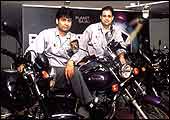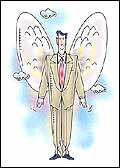|
One
reason why the uncompetitive chunk of Indian family businesses is
that way is because the man at the top reached there too late. Indeed,
in the pre-liberalisation era, a 40-something scion taking over
the mantle was considered 'young' for the job. Often, however, the
heir apparent had little choice but to keep waiting in the wings-and
then perhaps ponder about his own succession plan a few years later-since
the patriarch was in no mood to let go. R.P. Goenka was close to
50 before he took over the reins. Ratan Tata too was in his fifties
when he took charge, and the late Parvinder Singh got a chance to
articulate his pharma vision for Ranbaxy only in 1993, when his
father Bhai Mohan Singh finally stepped down.
 |
| Rajiv and Sanjiv Bajaj: tandem-ride |
These days, mercifully, 40 is considered embarrassingly
old an age to be taking over. And the results turned out by CEOs
who have been inducted early make a clear case for fossilised family
managements-who still manage to get entangled in operational and
administrative issues-to pass on the baton when they are in a cerebral
condition to do so. Worldwide, tycoons like Bill Gates and Ted Turner
are perfect examples of those who started early and went on to create
huge wealth.
 |
| Pawan Kant Munjal: early ascension |
 |
| Prashant Ruia: baptism-by-fire |
In India, Kumar Mangalam Birla is unarguably
the best manifestation of the speed and aggression youth brings
along with it. Birla might have been pitchforked into the action
a few years too early (by circumstance)-he was only 28 when he had
little choice but to assume charge-but in a couple of years he succeeded
in leaving his own indelible mark on the empire his father built.
The Ambani brothers too were anointed early-Anil was put at the
deep end in Reliance's Ahmedabad textiles unit after returning from
Wharton University, and Mukesh, after his stint at Stanford, cut
his teeth at the Patalganga plant. Rajiv and Sanjiv Bajaj, Pawan
Kant Munjal and Sulajja Firodia-Motwani are other examples of scions
blooded young, educated abroad, sent to the shopfloor and now showing
swifter decision-making and higher risk-taking qualities than the
earlier generation.
It hasn't, however, been smooth sailing for
all. The Ruia brothers, Prashant and Anshuman, had a veritable baptism
of fire, being inducted into the Essar Group when its mega-steel
plant ran into time and cost overruns, even as the global steel
industry sank into a depression. Vinay Rai's steel ventures-Usha
(India), Usha Ispat, Malvika Steel-too are in the wars. And the
Wadia sons, Jeh and Ness, make more news with their fast-track lifestyle
rather than for their initiatives at Neville House.
Then there is that breed of entrepreneur that
prefers that the offspring earn their spurs in a newly-created enterprise.
That's what Zee's Chairman Subhash Chandra has decided for his sons:
29-year-old Puneet Goyal is learning the ropes in the satellite
communications business (under the able guidance of a hardnosed
professional in the business, J.P. Singh), and the two other brothers,
Atul and Amit, are spearheading a foray into data centres. Chandra,
whose penchant for sensing high-risk opportunities is now legendary,
has promoted both these businesses.
-Brian Carvalho
Of Owners, Managers, And
Controllers
 |
| M.V. Subbaiah: letting go |
When French media
giant Vivendi acquired Seagram, the Canadian spirits, music, films,
and television major, last year, it marked yet another marriage
between content creators and its distributors, pretty similar to
the AOL-Time Warner merger. Yet, Vivendi's purchase of Seagram was
significant from another point of view,: it marked the end of family
control at the Canadian behemoth.
The Bronfman family owned closed to 24 per
cent in Seagram- enough to give it undisputed control over the spirits
and media colossus. Yet, the family had little choice but to look
for a buyer. Reason? The markets weren't happy with the company's
performance. Seagram is just one example of such ''investor capitalism'',
a phrase coined by Michael Useem, author of Investor Capitalism:
How Money Managers are Changing the Face of Corporate America, to
explain scenarios where the family has to give up control because
of under-performance.
In India, such stockmarket-initiated acquisitions
might haven't yet happened, but the spate of attempts by relatively
unknown predators-Arun Bajoria, Abhishek Dalmia, and Bahubali Shah
for family-run businesses like Bombay Dyeing, Gesco Corp, and Voltas-will
ensure that the controllers are always on alert. ''Families have
to prove that they're eligible for the job,'' points out Shailesh
Haribhakti, Managing Partner, Haribhakti Group.
Non-performing assets (NPA)-plagued financial
institutions (FIs), for their part, are finally beginning to exercise
their rights in companies in which they own a chunk of the equity.
Modi Rubber, in which the FIs control 44.5 per cent as against the
Modis' 23.4 per cent, is a case in point.
Many family businesses, to their credit, are
revamping their act. M.V. Subbiah, former chairman of the Murugappa
board for instance, stepped down and brought in a former Infosys
md, N.S. Raghavan, as non-executive chairman. Ranbaxy has non-family
members at the top, with Tejinder Khanna as chairman and D.S. Brar
as CEO.
The family may step back, but that doesn't
mean that the professional has a free rein. Remember Jacques Nasser?
The Ford family gave the marching orders to the CEO of Ford Motor
Co. His replacement? Family scion William Clay Ford Junior, the
great grandson of the company's founder.
-Brian Carvalho
Corporate governance: Fad
Or Fiction?
 In
the 1980s, Ashwini Puri, Head (Corporate Finance and Recovery),
PricewaterhouseCoopers, India, went to conduct a due diligence exercise
on a Delhi-based businessman who wanted to tie-up with a foreign
company. When Puri went to the man's house, he was astonished to
see his wealth. ''It was all black money.'' In
the 1980s, Ashwini Puri, Head (Corporate Finance and Recovery),
PricewaterhouseCoopers, India, went to conduct a due diligence exercise
on a Delhi-based businessman who wanted to tie-up with a foreign
company. When Puri went to the man's house, he was astonished to
see his wealth. ''It was all black money.''
Things have changed since then. Thanks to lower
tax rates, competition, and a code on corporate governance. The
latter appears to be a fad amongst family-run businesses. Ask any
chief executive of a family-run business, and you'll get a list
of a dozen initiatives the group is undertaking. And the Securities
and Exchange Board of India's (SEBI) code leaves little option.
As per SEBI guidelines, all Group A entities
of the BSE or those in the S&P CNX Nifty index as on January
1, 2000, had to comply with the corporate governance norms by March
31, 2001. By March 31, 2002, all listed entities that have a paid-up
share capital of Rs 10 crore have to meet the corporate governance
norms and by the end of the next financial year (2002-3), all listed
entities have to follow suit.
Amongst the first few companies to take corporate
governance seriously, according to the Confederation of Indian Industry
(CII) are Hindalco, Bajaj Auto, Nicholas Piramal, and Infosys. These
constituted their boards in line with today's corporate governance
norms.
But according to analysts, real corporate governance
means that companies become truly transparent. This means that they
issue profit warnings during a bad phase. As of now, companies that
are listed on overseas exchanges are doing so. The Indian stock
markets today don't punish companies that don't practice the corporate
governance code. Only when the markets mature will family-run businesses
begin to practise corporate governance in the real sense.
-Swati Prasad
Family-Man Vs Professional
Manager
 |
| Yet another fine Indian business family |
Ultimately it's
the stockmarket that passes the verdict. And the family's job is
to do what it takes to keep the equity analysts, fund managers and
the small investor in good spirits-not by making grandiose projections
and giving good sound bytes but by adopting good governance practices,
being transparent with information, and hiring the best people.
''The market supports stocks of family-owned businesses when they
perceive that the family involvement adds value and maximises very
shareholder's wealth,'' explains, Anand Mahindra, Vice Chairman,
Mahindra & Mahindra. So, if a family is committed to improving
and maximising shareholder wealth, it will ensure that it has the
best qualified people for the job-be they family members or professionals.
There's little doubt that for decades now,
there have been plenty of business families that have treated their
empires like personal property, other shareholders be damned. Clearly,
it's time for family members to get detached from their enterprises,
but that hardly means that they have no role to play. ''The family
has to play the role of the entrepreneur, outlining the vision,
providing the motivation. But it's the professionals who have to
run the company,'' points out Nimesh Kampani, Chairman, JM Morgan
Stanley. Mahindra uses the phrase ''aggressive venture capitalists'',
to describe what Indian business families have to transform themselves
into-the key decisions about where capital should be allocated lies
with the family.
Mahindra adds that there are certain roles
that a family just can't abdicate. In corporate level jobs, for
instance, where plenty of communication is required, family members
enjoy an edge over hired professionals. He cites the example of
the Firestone crisis at Ford in 2000-Firestone decided to recall
14.4 million tyres (most on the Ford Explorer) as they were unsafe-when
Chairman William Clay Ford Junior was used as the spokesman rather
than CEO Jacques Nasser. ''The image of Bill Ford, given that he
was a respected as a professional clearly lent more credibility
to the situation.''
To decide who is the best man for the job is
the task of the board. But for that, the board itself needs to be
fiercely professional and independent. For the many Indian groups
that have more family members on the board than external directors,
that should indeed be the first move.
-Brian Carvalho
|

